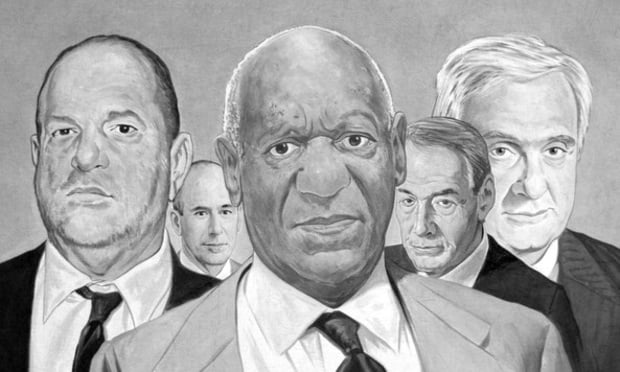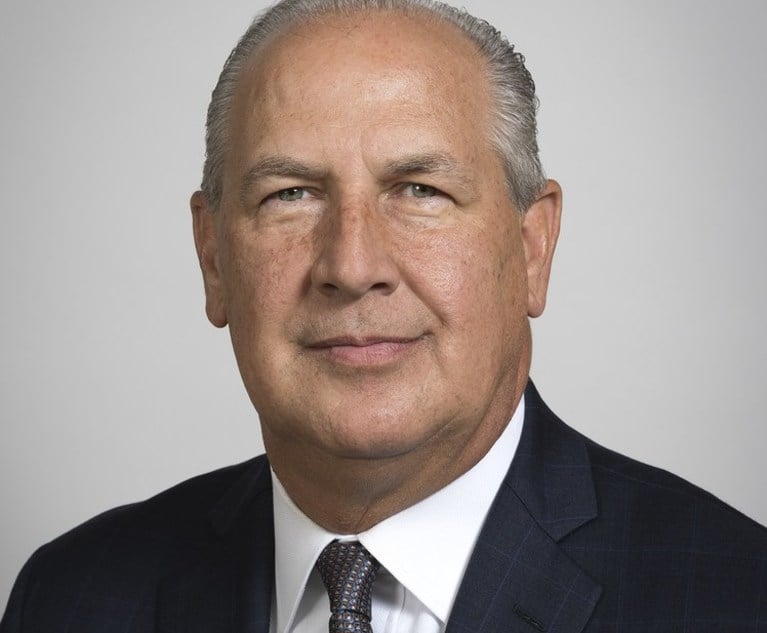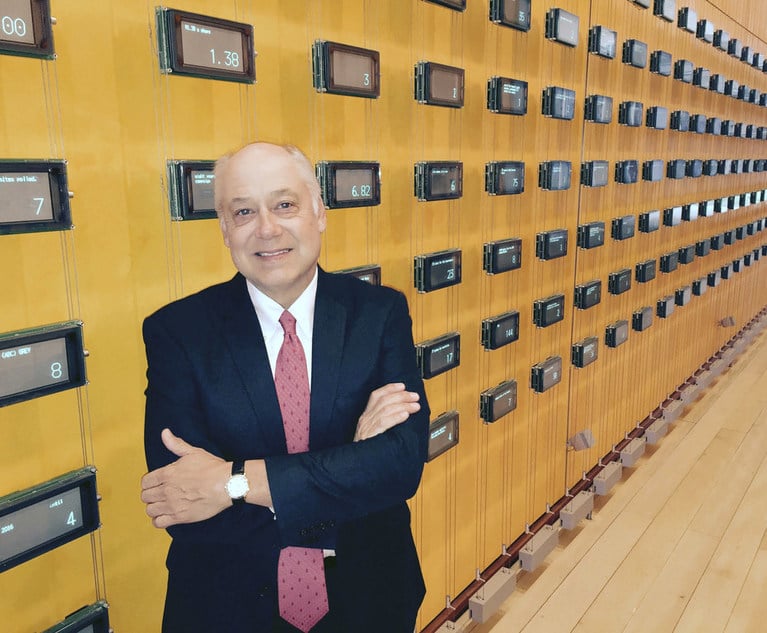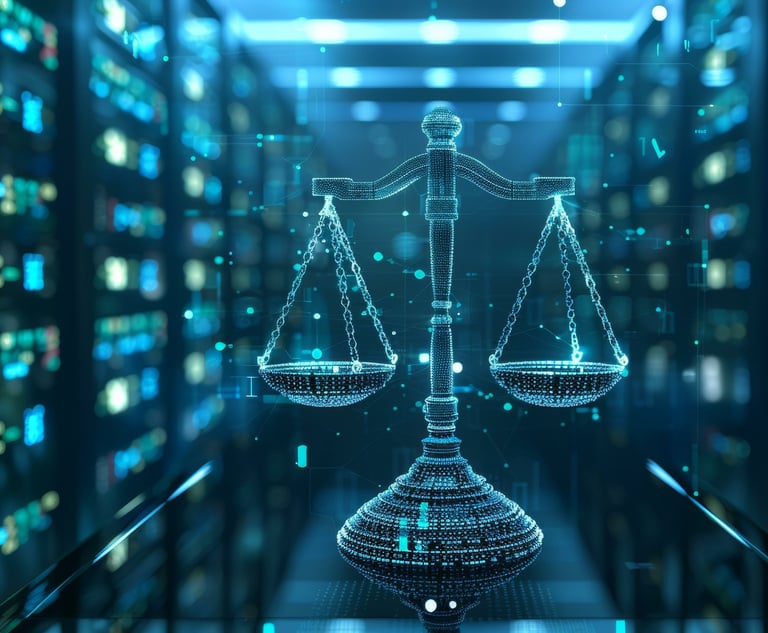#MeToo Movement Reframes Cosby's Retrial
As Bill Cosby's retrial looms, lawyers consider whether he can get a fair trial amidst the growing #MeToo movement?
February 01, 2018 at 05:00 AM
11 minute read
The original version of this story was published on National Law Journal

It's a growing roster: The men who had power and national acclaim in their fields—be it films and television, media, politics or law—and saw their reputations tank in a matter of days as women continue to reveal allegations of sexual harassment or assault.
One of these men, Bill Cosby, is gearing up for a retrial over aggravated indecent assault charges stemming from an incident that allegedly occurred 14 years ago. (The trial is currently set for April.)
Cosby has faced multiple public accusations of sexual assault—accusations that are now inextricably linked with an escalating national conversation on sexual assault.
By the end of 2014 allegations against Cosby had snowballed, as dozens of women came forward and said he had sexually assaulted them. Many went to the press. Others filed civil lawsuits, some of which are still pending. And Cosby's reputation as America's dad unraveled.
To date, only one of his accusers, Andrea Constand, has seen her allegations result in criminal charges. At trial, Cosby's lawyers contended that Constand was untruthful, arguing that there were inconsistencies in her accounts of the alleged assault.
After a weeklong trial and a week of jury deliberations in Cosby's case last June, a Pennsylvania judge declared a mistrial after jurors were unable to agree on a verdict.
Prosecutors pledged to retry the case. But since that first trial in June 2017, a storm has hit.
On Oct. 5, a piece by The New York Times revealed allegations by multiple women that movie mogul Harvey Weinstein had sexually harassed them. As days went on, the number of stories grew and came to include allegations of sexual assault, according to more reporting by that paper. Weinstein has apologized and has disputed the allegations against him. But that did nothing to quiet the conversation.
On Oct. 15, actor Alyssa Milano posted a tweet encouraging others to reply “me too” if they had ever been sexually harassed or assaulted. Tens of thousands of people responded to Milano's tweet alone, as #MeToo became plastered across various social media platforms. Women, both celebrities and the nonfamous, came forward with allegations against powerful men, and people were listening.
Weinstein faced professional consequences nearly immediately, getting fired from the company he co-founded within days of the Times report, and as other men faced accusations, they too saw their reputations and careers take a turn.
Matt Lauer was fired from NBC after the company received a detailed complaint accusing him of sexual misconduct, according to NBC's statement about his termination. CBS fired Charlie Rose less than a day after The Washington Post published allegations by eight women who say Rose sexually harassed them. Netflix cut ties with actor Kevin Spacey, and he was cut out of an upcoming film after multiple people publicly accused him of sexual misconduct, according to press reports.
In the legal sphere, former Ninth Circuit Judge Alex Kozinski quickly announced his retirement late last year, after several women publicly alleged that he sexually harassed them, including inappropriate comments, and allegations by four that he touched them inappropriately, according to a Dec. 15 report in The Washington Post.
In a mid-December statement, Kozinski said that many of the allegations against him were untrue, but apologized for making any of his clerks feel uncomfortable. Lauer, Rose and Spacey have also offered various apologies.
While the country watches these men face quickly unfolding consequences, lawyers from the Montgomery County District Attorney's office in Norristown, Pennsylvania, are preparing for Cosby's second trial. And Cosby's new defense team, Tom Mesereau of Los Angeles, Nevada lawyer Kathleen Bliss and local counsel Sam Silver of Schnader, Harrison, Segal & Lewis, is doing the same. [Ed note: Since this story went to print, Cosby's defense team has added Becky James of Greenberg Gross, and local counsel Samuel Silver has filed a motion to withdraw as counsel. As of Feb. 2, that motion is listed in the docket as pending, and Lane Vines of Berger & Montague in Philadelphia has entered his appearance in the case.]
“Your jury pool is now educated,” said Gina Maisto Smith of Cozen O'Connor, who chairs a practice group focused on institutional response to sexual misconduct. “Your jury pool is now saturated with the discussion … more in tune, aware, open to understanding and hearing about the psychological journey and impact of a sexual assault on an individual when the alleged perpetrator is a person who the individual knows and cares for.”
NO LONGER 'UNTOUCHABLE'
Since December 2015, when prosecutors in Montgomery County, Pennsylvania, announced charges against Cosby, his defense lawyers have questioned whether it's possible for their client to face a fair trial. Among other concerns, they contended it would be impossible to find jurors who had not heard of the numerous public allegations against Cosby.
Now, lawyers said, that concern may be ever more present.
“One of the considerations of the attorneys picking the jury, whether they're able to address it or not, will be the residual effect, whether there's backlash or not, from this 'me too' stuff,” said Joseph McGettigan, of McAndrews Law Offices, a former Pennsylvania prosecutor who has experience in high-profile criminal cases, having led the prosecution of serial child molester Jerry Sandusky in 2012.
“Jury selection is going to be even more critical here” for the defense, McGettigan said. “As a prosecutor, I'd be worried about this, too, because the defense is only looking for one” person with reasonable doubt.
Once the jury is chosen, McGettigan said, Cosby's defense may choose to frame Constand's story as just one in a wave of allegations brought too late by alleged victims. McGettigan's partner, Dennis McAndrews, also a former Pennsylvania prosecutor, said some people might latch on to that.
“As the prosecutor, my fear is that you get one or two holdouts … who believe that a lot of these allegations are either made up or overblown,” McAndrews said. Still, he noted, “There's another segment of the population that says we should believe every woman because there's no incentive to make it up.”
That segment of the population may be growing, McAndrews and others said, as a result of the recent wave of allegations against powerful men.
Gloria Allred, who represents many of Cosby's accusers, as well as one of Weinstein's accusers, said she speculates the 'Me too' movement could impact Cosby's jury, even though jurors are instructed to consider only the evidence presented in court.
“There have been accusations against many rich, powerful, famous men, [and] it would be difficult for anyone to ignore that,” Allred said. “The public in general is more believing of women who make the accusations now than they ever were before.”
Constand has alleged that Cosby drugged her at his home in Cheltenham, Pennsylvania, then digitally penetrated her vagina without her consent. She has said it happened in early 2004, but she did not tell police until 2005. Cosby's lawyers have repeatedly drawn attention to that delay, and raised questions about Constand's recollection of the alleged assault.
Cozen O'Connor's Smith said the increasing national conversation about sexual assault creates “more fertile ground for the prosecution to explain the delay in reporting and the context for the consent consideration.”
“The me too element will impact the capacity of the jury pool to be open to these questions and to analyze the tough, complex analysis of sexual assault and consent-based sexual assault,” Smith said.
Leslie Gomez, Smith's colleague and vice chair of Cozen O'Connor's institutional response group, said the recent allegations against celebrity men make some men no longer seem “untouchable.” Despite their earlier reputations and philanthropy, men like Weinstein and Cosby are losing their careers.
“Part of the challenge in this case is that Cosby is such an iconic father figure. It's that much harder to prove a credibility case when you have someone with such a good reputation or public image,” Gomez said. But the 'me too' movement “targeted individuals in the industry who otherwise seemed to have a similar reputation.”
Recent months have shown that sexual assault “can happen with individuals who we previously thought could not be capable of that kind of conduct,” she said.
McAndrews and McGettigan, who both attended and observed Cosby's first trial as members of the public, said an outright acquittal at retrial seems unlikely. “I'm more worried about this if I'm Bill Cosby,” McAndrews said. “People are being credibly accused, and many of them are admitting it … they're quitting their jobs and they're being fired.”
Andrew Wyatt, a spokesman for Cosby and his legal team, said they declined to be interviewed for this story and would not be engaging in any pretrial interviews. “Our attorneys, along with Mr. Cosby, prefer to try this retrial in the courtroom, not in the media,” Wyatt said in an Dec. 29 email.
Kevin Steele, the Montgomery County District Attorney leading Cosby's prosecution, declined to be interviewed about the retrial. But in a Jan. 5 e-mail statement to the National Law Journal, he made note of the increase in alleged victims coming forward.
“As I said in June after the jury was unable to reach a unanimous verdict, one of the positive outcomes from this trial is that we hope women who have been victims of sexual assault—and especially drug-facilitated sexual assault—will feel that they can come forward and be heard and face their assailant, knowing that they will be treated with the respect that they deserve,” Steele said. “And for a number of reasons, that seems to be happening now across the country.”
DUE PROCESS
The outcome of Cosby's retrial is just as much a landmark in the national conversation on alleged sexual misconduct as it is impacted by that conversation.
“We have been evolving on this journey for many, many years,” Smith said, since long before Weinstein was accused, and before Cosby was charged. Still, she said, “we're at the beginning of this conversation.”
Weinstein, Lauer, Rose and Kozinski all found their careers and personal lives derailed by the allegations against them. None of them have faced criminal charges as of mid-January, though the Los Angeles District Attorney's Office said it is reviewing allegations against Weinstein. “Two cases have been presented to our office by the Beverly Hills Police Department regarding Mr. Weinstein and are under review,” Sarah Ardalani, a public information officer with the office told The NLJ in a Jan. 12 e-mail.
And in New York, police are investigating allegations against Weinstein, Chief of Detectives Robert Boyce said Dec. 4. So are authorities in London according to reports by NPR and others.
As for Cosby, he has now seen his accuser take the stand and describe the alleged assault under oath in open court. (Constand also entered into a confidential settlement with Cosby in 2006, but a federal judge ruled in 2016 that her cooperation with prosecutors didn't violate the settlement.)
“There are high profile men who complained they didn't get due process, well, Bill Cosby is certainly getting due process in the court of law,” Allred said.
Constand's case also stands out because she did not have celebrity on her side when she brought the allegations, Constand's longtime lawyer, Dolores Troiani, noted. The ex-basketball player and massage therapist from Canada didn't get to know Cosby through television or modeling but through her job at Temple University, where Cosby was involved and influential.
“Andrea was not part of that [Hollywood] crowd, and the ladies who are coming forward now, they were,” Troiani said. “They had far more power than she did. She was unique.”
Because of that, she said, Constand's case can't be held equal with the other allegations against powerful men, and the verdict should not be seen as a bellwether.
But Smith, of Cozen O'Connor, said Cosby's trial will leave a lasting effect, no matter the outcome, by way of the public record it creates. “It will advance the ball on this conversation either way,” Smith said. “It will allow individuals to understand the complexity of these cases … and the grave consequences.”
This content has been archived. It is available through our partners, LexisNexis® and Bloomberg Law.
To view this content, please continue to their sites.
Not a Lexis Subscriber?
Subscribe Now
Not a Bloomberg Law Subscriber?
Subscribe Now
NOT FOR REPRINT
© 2025 ALM Global, LLC, All Rights Reserved. Request academic re-use from www.copyright.com. All other uses, submit a request to [email protected]. For more information visit Asset & Logo Licensing.
You Might Like
View All
Montgomery McCracken Touts 'Record' Financial Performance Despite Shrinking Head Count
6 minute read
Class Action Settlements Totaled $40B+ Three Years in a Row: 'We’re in a New Era'
5 minute read
AI's Place in Big Law Broadens, As Firms Embrace Fresh Uses of the Technology
Trending Stories
- 1Plaintiff Argues Jury's $22M Punitive Damages Finding Undermines J&J's Talc Trial Win
- 2Bannon's Fraud Trial Delayed One Week as New, 'More Aggressive,' Defense Attorneys Get Ready
- 3'AI-Generated' Case References? This African Law Firm Is Under Investigation
- 4John Deere Annual Meeting Offers Peek Into DEI Strife That Looms for Companies Nationwide
- 5Why Associates in This Growing Legal Market Are Leaving Their Firms
Who Got The Work
J. Brugh Lower of Gibbons has entered an appearance for industrial equipment supplier Devco Corporation in a pending trademark infringement lawsuit. The suit, accusing the defendant of selling knock-off Graco products, was filed Dec. 18 in New Jersey District Court by Rivkin Radler on behalf of Graco Inc. and Graco Minnesota. The case, assigned to U.S. District Judge Zahid N. Quraishi, is 3:24-cv-11294, Graco Inc. et al v. Devco Corporation.
Who Got The Work
Rebecca Maller-Stein and Kent A. Yalowitz of Arnold & Porter Kaye Scholer have entered their appearances for Hanaco Venture Capital and its executives, Lior Prosor and David Frankel, in a pending securities lawsuit. The action, filed on Dec. 24 in New York Southern District Court by Zell, Aron & Co. on behalf of Goldeneye Advisors, accuses the defendants of negligently and fraudulently managing the plaintiff's $1 million investment. The case, assigned to U.S. District Judge Vernon S. Broderick, is 1:24-cv-09918, Goldeneye Advisors, LLC v. Hanaco Venture Capital, Ltd. et al.
Who Got The Work
Attorneys from A&O Shearman has stepped in as defense counsel for Toronto-Dominion Bank and other defendants in a pending securities class action. The suit, filed Dec. 11 in New York Southern District Court by Bleichmar Fonti & Auld, accuses the defendants of concealing the bank's 'pervasive' deficiencies in regards to its compliance with the Bank Secrecy Act and the quality of its anti-money laundering controls. The case, assigned to U.S. District Judge Arun Subramanian, is 1:24-cv-09445, Gonzalez v. The Toronto-Dominion Bank et al.
Who Got The Work
Crown Castle International, a Pennsylvania company providing shared communications infrastructure, has turned to Luke D. Wolf of Gordon Rees Scully Mansukhani to fend off a pending breach-of-contract lawsuit. The court action, filed Nov. 25 in Michigan Eastern District Court by Hooper Hathaway PC on behalf of The Town Residences LLC, accuses Crown Castle of failing to transfer approximately $30,000 in utility payments from T-Mobile in breach of a roof-top lease and assignment agreement. The case, assigned to U.S. District Judge Susan K. Declercq, is 2:24-cv-13131, The Town Residences LLC v. T-Mobile US, Inc. et al.
Who Got The Work
Wilfred P. Coronato and Daniel M. Schwartz of McCarter & English have stepped in as defense counsel to Electrolux Home Products Inc. in a pending product liability lawsuit. The court action, filed Nov. 26 in New York Eastern District Court by Poulos Lopiccolo PC and Nagel Rice LLP on behalf of David Stern, alleges that the defendant's refrigerators’ drawers and shelving repeatedly break and fall apart within months after purchase. The case, assigned to U.S. District Judge Joan M. Azrack, is 2:24-cv-08204, Stern v. Electrolux Home Products, Inc.
Featured Firms
Law Offices of Gary Martin Hays & Associates, P.C.
(470) 294-1674
Law Offices of Mark E. Salomone
(857) 444-6468
Smith & Hassler
(713) 739-1250






